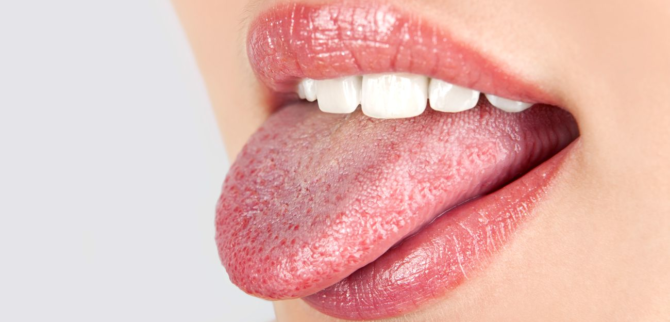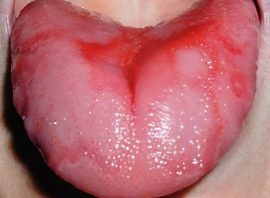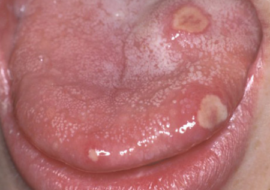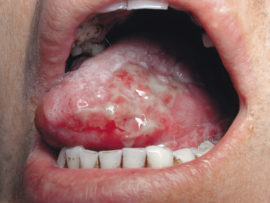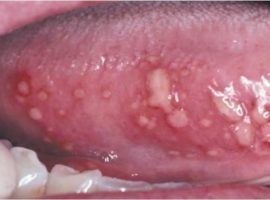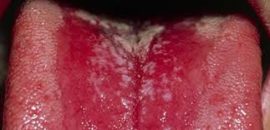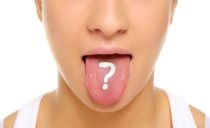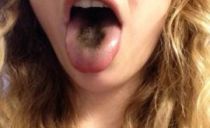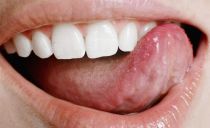The tongue hurts from the side and at the base: what does it mean, reasons, how to treat
Language is an organ that reflects the state of the whole organism, so you need to be careful about any changes in its appearance and sensitivity. Since the tongue can hurt from the side, above and below for various reasons, it must be treated under the strict supervision of a doctor.
Content
Why does the tongue hurt from the side, at the base or edge of an adult
To understand why the tongue hurts, you need to pay attention to in which part of it the pain was localized.
| Pain localization | Possible reasons |
|---|---|
| Tip |
Pain at the tip of the tongue may occur due to biting or burning. The pain caused by trauma to the tongue can be quite severe, but it usually goes away quickly. The second reason that the tip of the tongue may hurt is the development of glossalgia. This is a syndrome accompanied by soreness and burning of the tongue for no apparent reason. Glossalgia is usually manifested precisely at the tip of the tongue, much less often the disease affects its sides and edge. The disease can spread to the entire oral cavity and requires immediate medical attention. |
| Side part |
On the sides of the tongue, pain can occur due to the development of stomatitis (glossitis) or allergies. Stomatitis is an inflammation of the oral mucosa. When an ailment is localized only in the area of the language, it is called glossitis. The disease is accompanied by painful rashes and bad breath. Often, pain on the sides of the tongue appears due to excessive smoking, neuralgia, or injuries resulting from uncorrected dentures or fragments of decayed teeth. For the same reason, the tongue can hurt from the edge. |
| Base | If the base of the tongue is very inflamed and hurts, then it is worth checking for the presence of allergies, glossalgia, diseases of the digestive tract, vitamin deficiency, glossitis. In addition, you need to make sure that there are no phlegmon and abscesses, since purulent-inflammatory pathologies usually affect the base of the tongue. |
Inflammation (glossitis)
Pain in the tongue from above, from the side and in the middle often indicates the development of glossitis - an inflammatory disease that can have a different etiology: fungal, viral, bacterial, allergic. The tactics of treating this pathology depend on the type of pathogen: a viral infection cannot be defeated with antibiotics, and a bacterial infection with antiviral drugs. Therefore, the treatment of glossitis should be started only after a thorough diagnosis and under the strict supervision of a doctor.
Glossitis may be accompanied by an increase in sublingual lymph nodes, sore throat, difficulty swallowing. The main symptom of the disease is a rash localized on the mucous membrane of the tongue. They can be similar to round aphthae, herpetic vesicles or sores and almost always appear in tandem with a white, yellow or gray coating.
The tongue can become inflamed if the oral hygiene is not followed, injuries are present, and immunity is weakened. The most common types of glossitis and their corresponding symptoms are listed in the table:
| A variety of glossitis, photo | Symptoms |
|---|---|
|
Catarrhal |
Profuse salivation, weakening of taste sensitivity, redness of the mucous membrane of the tongue, soreness. |
|
Ulcerative |
The formation of ulcers from the side, in the middle, at the base or at the end of the tongue. Swollen gums, bad breath, dullness of taste. |
|
Purulent-phlegmonous |
The formation of ulcers and suppuration, purulent breath, redness of the mucous membrane of the tongue, increased salivation, temperature, weakness, impaired taste. |
|
Herpetic |
The appearance of vesicles filled with transparent exudate, and the remaining symptoms characteristic of glossitis. |
|
Candidiasis |
The appearance of red ulcers, covered with a white curd coating, and the remaining symptoms characteristic of glossitis. |
Allergy
The cause of redness, swelling and soreness of the tongue can be an allergic reaction. Common allergens are:
- Products: pineapples, kiwi, oranges, berries and others.
- Cosmetic products. It is necessary to carefully choose cosmetics not only for the lips, but also for the face. Poor-quality creams can cause a pronounced allergic reaction, accompanied by the appearance of rashes and swelling in various areas of the oral cavity. It is especially dangerous when the base of the tongue becomes inflamed and swollen, since such a phenomenon can lead to difficulty breathing.
- Poor alcohol. If the skin is covered with red spots during the drinking of alcoholic beverages, then they have become inflamed due to allergies. In this case, you need to urgently stop drinking alcohol.
When using low-quality red wines, the tongue becomes colored and begins to pinch, which can only mean one thing - the drink contains a caustic dye. In women, an allergic reaction to wine of inadequate quality occurs many times more often than in men.
Inflammation of the sublingual salivary gland
If the left or right edge of the tongue is swollen, nipples and hurts, it is worth checking the condition of the hyoid salivary gland. With the development of this disease, it becomes painful to chew, swallow food and talk. In addition, the disease is characterized by:
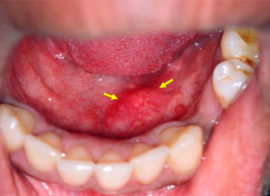 Decreased salivation and dry mouth.
Decreased salivation and dry mouth.- With inflammation of one gland - swelling, pain in the area of the affected gland and in the tongue on its side (right or left), as in the photo.
- With inflammation of both glands - swelling and pain in the gland and base of the tongue.
- Rise in temperature.
- Redness of the oral mucosa.
- Swelling of the lower face and chin.
If this symptom occurs, you should immediately consult a doctor. The uncontrolled course of the disease, as well as self-medication, can lead to serious complications, including:
- Phlegmon.
- Fistula.
- Stenosis (narrowing) of the ducts.
- Salivary stone disease.
Neuralgia
The tongue may itch against the background of neuralgic diseases. The reason why the tongue hurts from the side on the left or on the right against the background of numbness, tingling, burning, may be a neuro-dental syndrome or glossalgia. Disorders in the central nervous system, hormonal disruptions, stress and psycho-emotional disorders lead to the disease. This means that women have glossalgia several times more often than men.
Symptoms of the disease:
- Heaviness, discomfort, feeling that the tongue is "tired", swollen, itchy.
- Pain, burning on either side of the tongue - left, right, in the middle, at the base.
- Numbness and tingling.
- The disappearance of all symptoms during meals.
Injuries
Injuries are one of the most common causes of pain on the sides of the tongue. Types of damage:
- Mechanical. Appear as a result of hasty chewing of food, intensive brushing of teeth. These actions lead to scratches, cuts, biting. In the presence of microtraumas, the tongue begins to itch. Even minor mechanical damage can provoke inflammation and pain in the tongue from the side - this is where the organ is injured most often.
- Thermal. They occur as a result of burns. Too hot food injures the tongue, causes pain and provokes the inflammatory process.
On the side of the right and left, the tongue can hurt due to an injury resulting from an incorrect bite, an incorrectly installed denture, and the presence of chips on the teeth. Most often, microtrauma in the mouth appears during the period of getting used to established orthopedic constructions.
Oncology
Sometimes the cause of pain in the tongue is malignant and benign neoplasms. In oncology, the pain syndrome is localized inside the organ, the tongue can hurt both on the sides and at the base. In women, cancer in the oral cavity is several times less common than in men.
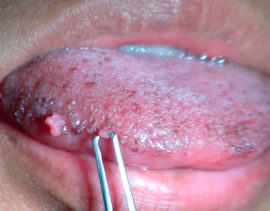 The severity of pain and associated symptoms depend on the stage of development of the disease:
The severity of pain and associated symptoms depend on the stage of development of the disease:
- Initial. It is characterized by the presence of whitish spots, papillomas, small seals covering the lateral surfaces of the tongue.
- Medium. It is characterized by severe pain, increased salivation, bleeding of the tongue. Perhaps the formation of an ulcer or dense growth, abundantly covered with papillomas - see photo.
- Heavy. Accompanied by severe pain and tumor growth.
Why does the child have a sore tongue and oral mucosa
In children, the tongue hurts for the same reasons as in adults. However, the following should be noted:
- Soreness of the tip of the tongue can be caused by trauma, beginning with stomatitis, allergies.
- Pain in the tongue from the side is often the result of trauma, especially during teething, allergies, especially if the tongue is swollen, stomatitis.
- The root often swells and hurts against the background of viral and infectious diseases (SARS, tonsillitis).
Regardless of the severity of the pain syndrome, you should immediately contact your local pediatrician. You can not treat young children on their own. If it is not possible to consult a doctor on the day the symptoms are detected, you can use harmless folk painkillers:
- give your child tea with chamomile, which has an anti-inflammatory and soothing effect;
- persuade the baby to make an oral bath (holding fluid in the mouth) or rinse your mouth with a weak soda solution.
It is necessary to adjust the children's diet. Eating them food should be soft, warm and not irritating to the damaged and inflamed mucous membrane of the oral cavity. Spicy, spicy and sour dishes should be excluded from the daily children's menu.
How to treat pain in the tongue on the side, at the base and on the tip
The reason why the tongue hurts at the root, edge or on the sides, can only be determined by a doctor. Therefore, if there is pain and discomfort in the mouth, you need to consult a dentist or therapist as soon as possible, who will be redirected to another specialist if necessary.
The treatment complex is prescribed taking into account the root cause that caused pain on the side, in the middle or at the base of the tongue:
- Allergies are effectively eliminated by antihistamines in combination with sorbents.
- Glossitis is eliminated through complex therapy, which includes the use of anti-inflammatory, antiseptic drugs, as well as antifungal, antibacterial or antiviral drugs, depending on the causative agent. For local treatment of the inflamed oral mucosa, dentists prescribe special gels, ointments, solutions, and balms.
- Incorrectly installed prostheses, fillings of inappropriate form require treatment in a dental clinic.
- Disruptions in the endocrine system and hormonal disruptions are corrected by the endocrinologist through hormone therapy.
- Diseases of the gastrointestinal tract should be treated through complex therapy: diet therapy, sorbents, enzymes, antacids, drugs that improve the digestion process.
What to do at home
There is no need to decide on your own what to do if the tongue is sore and swollen from the side, in the middle or at the base - you should immediately consult a dentist.If you can’t immediately get an appointment with a doctor, you can temporarily alleviate the condition using folk remedies:
- Rinse the mouth with a warm decoction of chamomile, calendula or sage. Decoctions will help relieve pain, inflammation and itching.
- Rinsing the mouth with a solution of soda and salt - natural antiseptics. In a glass of hot water you need to dissolve a teaspoon of salt and the same amount of soda. The finished solution must be cooled. Rinse should be done twice a day.
If the tongue is swollen, itchy, itchy and sore from the side to the left, in the middle from above or at the tip, you do not need to deal with the problem yourself with the help of folk remedies. Only a doctor can cure diseases that provoke such symptoms. Therefore, you need to seek medical help as soon as possible.

